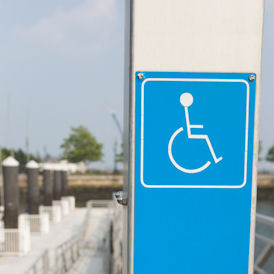Benefits reform: disabled people ‘terrified’ by changes
As the Welfare Reform Bill progresses through Parliament, disabled writer Lucy Glennon writes for Channel 4 News that the reforms could see the disabled become poor, isolated, and forgotten.

Today, there is to be a second reading on the Welfare Reform Bill, which affects all manner of provision including Housing Benefit, Incapacity Benefit – now renamed the Employment Support Allowance – and the Disability Living Allowance (DLA).
These changes will affect disabled people in a multitude of ways.
Louise Bolotin, a journalist who has epilepsy, depends on her DLA award to get around town for work.
Surely the Government would rather I work and pay more into the national pot, and have a better quality of life? Louise Bolotin, a journalist who has epilepsy
“I’m not permitted to drive because of my fits so travelling anywhere can often be problematic,” she said.
“I mostly work from home but go out most days for meetings or interviews. Obviously the cash benefit means I can fund taxis when I need to get from A to B. I can save time by taking cabs – a trip will only take 15-20 minutes instead of an hour or more, so I can work more efficiently thanks to the DLA.”
Quality of life
However, Louise pointed out that DLA is a gateway to other non-cash benefits for disabled people, such as disabled concession bus passes and the Disabled Rail Card.
Read more: benefits reform is 'biggest shake-up for 60 years'
“If my DLA is taken away I simply won’t be able to get around very much and I won’t be able to afford to either. I’d probably have to give up my job, which I love, and if that happens, I’d be totally dependent on benefits,” she said.
“DLA means I can work, pay my taxes and NI – all the things that help fund it. Surely the Government would rather I work and pay more into the national pot, and have a better quality of life?”
‘Ignorant’
DLA is a complicated and time-consuming benefit to apply for, yet once it is in place and sorted, the system works fine. Part of the changes to DLA that the Government is making is scrapping mobility payments for disabled people who live in care homes.The Government is removing them, as they see living in a care home as the same as having a prolonged stay in a hospital, therefore people in care homes do not require any mobility assistance for transportation and getting out.
This is an incredibly ignorant judgement. The Government has a bleak view of care home residents.
This is an incredibly ignorant judgement, as hospital patients are there to rest and recuperate while receiving treatment, and so, will be very ill and unlikely to venture out.
But people who reside in care homes could be there for a multitude of reasons, from requiring constant supervision from care workers, to needing physical aid. This would not mean that they are necessarily confined and restricted from going out, alone or with a carer.
The mobility component of DLA can help towards paying for an adapted vehicle, or covering the cost of taxi fares for leisure trips, hospital visits or to attend college. The Government has a bleak view of care home residents, and clearly has low expectations of their abilities and needs.
From 2013 everyone on DLA will be reassessed for entitlement to the benefit in an effort to try to save money and cut the 0.5 per cent of fraudulent claims – a figure lower than the rate for office error or for pension and Child Benefit fraud. The 70 per cent of claimants who receive an indefinite award for DLA – meaning that they have a disability which will never get better or be cured – will be reassessed first.
This recall of DLA recipients to go through the process again is extremely worrying, particularly for people with mental disabilities who have fluctuations in their condition and may appear fine for the most part though not having an obviously visible condition.
Incapacity Benefit
There is also to be an overhaul of Incapacity Benefit (now called the Employment Support Allowance). Everyone on IB will be reassessed through a questionnaire and a work capability assessment carried out by Atos, who are seeing 11,000 people a week, starting with with the long-term and severely disabled. The assessment has been heavily criticised by those who have already had it in trials, and called “a complete mess” by Professor Paul Gregg, who originally helped develop it.
The Government says it has to overhaul the system to save £1bn over five years but so many are being assessed incorrectly. Appeal tribunals report 40 per cent of claimants are incapable of work, contrary to findings of the Atos assessment. While reassessments may fish out a tiny percentage of false claimants or place some on the lesser-paying Job Seekers’ Allowance, the increasing number of appeals is costly.
Pressure
Siobhan O'Neill's partner works as an independent mental health advocate. Part of his job involves supporting people through the appeal process and tribunals to reverse decisions that have stopped a client's DLA or IB.
She said: "My partner helped a lone parent who'd been told last May she was ineligible for IB despite struggling with chronic back problems. This woman couldn't sit or stand for more than 15 minutes at a time. Her kids help her put her shoes on, and she cannot walk to the shop at the end of the road 200m away without resting.
"For nearly a year she's battled the additional stress of potentially having her benefits removed and she's worried about how she will support her children when she's physically incapable of her work. The medical assessment revoked her entitlement to benefits and scored her zero points. Their basis for this was that she opened the door to the assessment room unassisted, while using crutches, and that she could bend to reach an envelope she had propped against her chair."
"At the appeals tribunal she struggled with the emotional pressure of relying too heavily on her kids. They awarded her the points she needed, based on two years of medical evidence, and her own account of daily difficulties managing the house and children. My partner knows the process can be particularly stressful for people with mental health problems who don't wear their disabilities on their sleeve, so to speak. Often, based on ancient stereotypes of mental illness, at the medical assessment they lose marks for arriving smartly dressed or washed and shaved, with brushed hair. But who among us is likely to turn up to an official appointment with strangers in dirty clothes and with straggly hair?"
Read more from Channel 4 News on welfare reform: is benefits culture a myth?

Cuts and care crisis
Cuts to councils around the country are already biting into the lives of disabled people. In some boroughs, people requiring night-time care for toileting assistance have been given nappies and waterproof sheets to soil, saving time for carers, who then change and clean the patients when attending to them in the morning.
Care users who have requested more hours for extra assistance due to deteriorating conditions have been advised not to apply for more help, as it would put their care package under review possibly leading to it being decreased or cut altogether.
Cuts to councils across the country are already biting into the lives of disabled people.
Care agencies are under orders to implement systems that require carers to login and logout when visiting homes of patients to monitor their time. If a particularly efficient carer finishes their tasks and jobs with a patient in half an hour instead of an hour, they would be paid half the money. They can also be punished if they stay longer than the time allotted.
The cuts have also put an end to the Independent Living Fund which was available to disabled people who required a lot of additional care and support. The fund helped them pay for services, covering the cost of cleaning and meals, enabling them to live a comfortable and sanitary life like anyone else.
Isolation
Clubs and leisure groups for mentally disabled people have been scrapped, which will be a huge loss to those who rely on them for fitness, leisure and social interaction. Disabled and elderly transport services are under review. Some have stopped altogether, further isolating the poorest and weakest people in the community.
Read more from Channel 4 News: disabled people fear losing out over benefits reform
I use a Taxicard scheme in Camden, which provides subsidised black cab fares, which is incredibly useful for me as I cannot use public transport. I use the card to cut the cost of cab fares to hospital appointments, essential shopping trips and visits to relatives. The cost of the fares through the card is going to increase, and restrictions are being placed on it to prevent it being used for very long journeys, which is a particular problem for me as I use it for being able to afford travelling long distances.
All these changes and more are a great source of worry for Kaliya Franklin, who has Ehlers-Danlos syndrome, a painful and exhausting condition that causes frequent sprains and dislocations.
I know some people would consider ending their lives should they lose their help. Kaliya Franklin
“The worst part is the stress and anxiety. When will I be called for reassessment? Will I be lucky and the medical evidence provided by my GP and consultants taken into account or will that be disregarded by an administrative decision maker, my answers ignored and I’ll found fit for work anyway?” she asked.
“If that happens I’ll lose my home, all the ‘big society‘ support my neighbours provide and be forced to seek not just housing but an expensive care package from my local authority, if they could house or provide care for me at all. Those questions are weighing heavily on the minds of my disabled friends and making them seriously depressed. I know some people would consider ending their lives should they lose their help.
“I think a system that put the needs of sick and disabled people at the heart of its design would naturally weed out fraudulent claimants, but as we are already seeing, a system which places the elimination of fraud at its heart, only breaks those of the people it’s meant to help. Those committing fraud are unafraid while those of us with no choice but to rely upon it are left terrified.”
Kaliya and her friends are not alone in their worry. Disabled people are using the internet to share their stories and express why they are opposed to the welfare changes. And it is not just disabled people, but their carers who worry too. Riven Vincent posted in desperation on Mumsnet about asking social services to take her daughter with quadriplegic cerebral palsy, epilepsy and blindness into care after being refused extra support for respite care.
Should the MPs go ahead with the reforms, the disabled will face harsh times, and this will affect their carers, families and create a poor and isolated group that will be forgotten.
Lucy Glennon is a writer living in London, and she has epidermolysis bullosa.